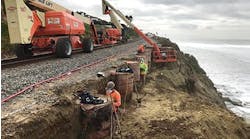Don't expect Ed Reiskin, the San Francisco Municipal Transportation Agency's new executive director, to oversee Muni for a couple of years, then start looking for a new job with another transit agency.
"I don't plan on going anywhere," said Reiskin, currently the city's public works director. "My youngest daughter just completed year one of a nine-year Cantonese immersion program and my wife is a native San Franciscan, so we are very committed to being here in the city. I will be in this job as long as they'll have me."
After several weeks of being rumored as Mayor Ed Lee's favored choice for the job, Reiskin, 44, was officially introduced as the agency's new chief executive Thursday morning by MTA board Chairman Tom Nolan. He called Reiskin "a leader and someone who is a very fast learner."
Relying on MuniIn his new job, Reiskin will oversee Muni - the nation's eighth-largest transit system - and San Francisco's parking, traffic management, bicycle, pedestrian and taxi programs. He will begin his new job Aug. 15 and be paid $294,000 a year with a three-year contract.
Some MTA board members, who hire the agency's chief, had said they were looking for a leader who would stick around to see plans and projects completed. Reiskin replaces Nathaniel Ford, who resigned last month after 5 1/2 years when some directors became frustrated with his well-publicized efforts to get hired at other transportation agencies.
Reiskin has worked for the city since 2007, first as director of the 311 customer service center, then as head of the Department of Public Works since 2008. He's also held executive posts in Oakland and Washington.
He has no experience heading a transit or transportation agency but brings a consumer's perspective to the job. He hasn't owned a car since 1991, and he and his family, who live in the Lower Haight, rely on Muni, bicycling and walking to get around.
"I definitely do have an advantage not being a transit person, not being from inside the MTA, of being able to ask a lot of questions," he said. "I can come in with a fresh perspective and ask: Why is it done this way? Why are we doing this? Why is that important? Why can't we do this?"
Support, scrutinyReiskin moves into what may be the city's toughest job with strong support from the mayor, the Board of Supervisors and transportation advocates. But he will face relentless scrutiny and criticism.
Reiskin said he's not walking into the job with all the answers. He plans to meet frequently with employees, not just his executive team, and will spend a lot of time away from MTA headquarters, talking to the operators and mechanics in the field.
"I don't want MTA headquarters to be seen as some distant ivory tower issuing edicts from afar," he said.
Reiskin did say he supports the Central Subway, is impressed with the SFpark parking management program, and likes the idea of wrapping buses with ads to raise revenue. He pledged to improve Muni service, which has never met the 85 percent on-time performance goal set by voters in 1999, but questioned whether that standard is the best measure.
"I don't think most people even care if there is a schedule or if we adhere to it," he said. "They just want to know that the bus will show up on a reasonable basis. I think that's what passengers want and the drivers want, too."
Supervisor Sean Elsbernd, who spearheaded Proposition G, the voter-backed ballot measure that gave Muni management more power to make changes, said Reiskin has the skills needed to implement it.
"The flipside of challenge is opportunity," he said. "The greater the challenge, the greater the opportunity."
Copyright 2008 LexisNexis, a division of Reed Elsevier Inc. All rights reserved.
Terms and Conditions | Privacy Policy


